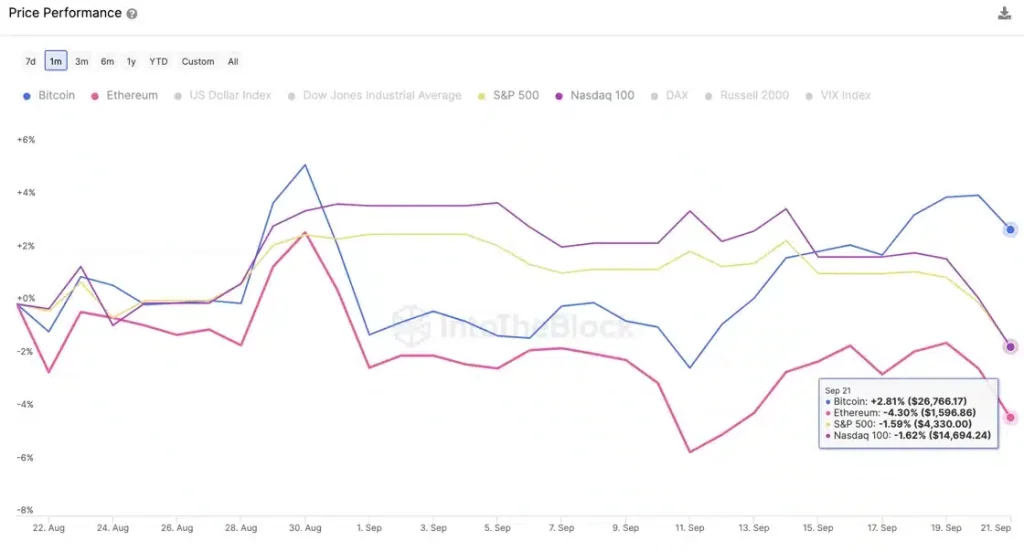- Bitcoin showed less correlation with stocks and dollar indices.
- Long-term holders’ conviction kept BTC steady.
Over the last few months, Bitcoin [BTC] has wiggled in narrow trading ranges, with only substantial crypto-specific developments culminating in breakouts. Since the start of September, the king coin has oscillated between the highs of $25,000 and lows of $27,000, data from CoinMarketCap showed.
How much are 1,10,100 BTCs worth today?
Unlike in the past, the outcome of key macroeconomic catalysts like the Federal Reserve’s interest rate decision does not appear to have a significant impact on BTC.
Bitcoin decouples
The U.S. Central bank left the interest rate unchanged in the recent FOMC meeting, but signaled one more rate hike by the end of the year. While this development rattled the equity indices, the largest crypto asset fought back with tenacity.
According to on-chain research firm IntoTheBlock, the bellwethers of the U.S. financial market Nasdaq 100 and S&P 500 fell 3.3% and 2.7% respectively, over the past week.
But despite the turbulence in traditional finance, Bitcoin stuck to its $26,500-level, achieving marginal weekly gains of 0.02% at press time. Moreover, the king coin’s monthly performance evidently outperformed that of TradFi assets.

Source: IntoTheBlock
Therefore, it begs the question – What is keeping Bitcoin intact in a deteriorating macroeconomic environment?
As per IntoTheBlock, Bitcoin’s correlation with the U.S. Dollar Index (DXY) hit zero recently. This played a part in shielding it from the ongoing rally of the index, which measures USD’s strength against a basket of six foreign currencies.

Source: IntoTheBlock
Interest rate hikes by the Fed applies significant upward pressure to DXY, as the policy results in increased demand for dollars from foreign investors. This typically leads to a capital flight to safe havens like the USD from riskier assets like stocks and crypto.
However, the weakening correlation meant that issues pertinent to U.S. dollar movement would have little significance for BTC. These events underlined that Bitcoin was increasingly getting decoupled from TradFi entities and more sensitive to happening restricted to the crypto space.
Crypto-related triggers move BTC
Most of the significant rallies in recent times came in response to news around Bitcoin spot exchange-traded fund (ETF) applications. This included Grayscale’s big victory against the U.S. Securities and Exchange Commission (SEC) and delays on decision on more than half-a-dozen filings.
As a result, Bitcoin holders resisted temptations and waited for outcomes around these ETF applications to offload their bags.
These factors also keeping BTC steady
Another key development that reduced BTC’s sell pressure was the decision by the defunct crypto exchange Mt. Gox to extend the repayment deadline to October 2024. The Bitcoin exchange went bankrupt after a massive theft of nearly 850,000 BTCs came to light.
The market was on the edge considering the size of the repayments. However, the delay managed to calm the sentiments.
Bitcoin’s steadfastness could also be attributed to its growing dominance in the crypto landscape. In recent weeks, the king coin’s market share surged to 50%, the second time such a feat was recorded in 2023.
The gulf between Bitcoin and the second-largest crypto, Ethereum [ETH], widened. As per IntoTheBlock, the ratio of Bitcoin’s market cap to Ether’s market cap hit a yearly peak over the past week.
Typically, large-cap cryptos are likely to be less volatile than other assets with a lower market cap.

Source: IntoTheBlock
Long-term holders continue to accumulate
Last but not the least, the remarkable conviction shown by long-term holders (LTH) of Bitcoin remains a key reason behind Bitcoin’s steady levels. These seasoned investors have utilized the suppressed prices in the bear market to add to their stocks.
As per Glassnode, BTC’s dormant supply has charged to new highs in 2023, with most key age bands exhibiting strong HODLing behavior.

Source: Glassnode
Is your portfolio green? Check out the BTC Profit Calculator
In fact, the total supply controlled by these diamond hands accounted for 75% of the total BTC’s in circulation at the time of writing.

Source: Glassnode
It seemed like the LTH’s resilience may help BTC sail these testing periods of the bear market. But, with the halving event due next year, as well as anticipation about spot ETF approvals, make no mistake: this cohort wouldn’t be shy about taking profits during a bull market.


